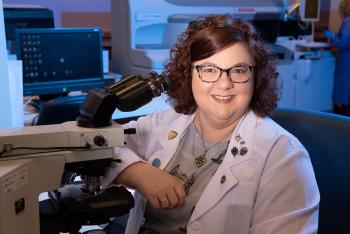Inspira Health is featured in a national colorectal cancer care report issued by Fight Colorectal...
Read More
Colorectal cancer is most often prevented with the removal of precancerous growths, and it can be cured if detected early.
Colorectal Cancer is known as "The Silent Killer" because it can develop and grow without symptoms in most cases until it is in its advanced stages.
Most colorectal cancers start as precancerous growths. Your risk for colorectal cancer increases with age, and some people are at an even higher risk depending on their personal or family history.
Because symptoms can be sneaky and hard to identify, the disease can spread without warning signs., This is why routine colorectal cancer screenings are vitally important, whether you are experiencing symptoms or not. Leading a healthy lifestyle and eating a well-balanced diet rich in fruits and vegetables is also key in preventing colorectal cancer.
Understanding the symptoms of colorectal cancer can help you recognize them. If you experience the following symptoms—especially if you’re 45 or older—speak with your doctor and get an exam:
The symptoms of colorectal cancer may resemble other conditions, such as infections, hemorrhoids and inflammatory bowel disease. Remember, it is also possible to have colon or rectal cancer and not have any symptoms. Always consult your physician if you have any questions or concerns.
The American Cancer Society recommends men and women follow stool-based or visual examination schedules starting when they turn 45 years old. People at a higher risk should consult a doctor about starting earlier.
Learn more about your screening options here.
Because no two patients are exactly alike, there are several personal factors that will determine how your Inspira physician will proceed in treating your colorectal cancer, including:
For most early-stage colorectal cancers, surgery is the best option as it is the easiest way to remove all present cancer cells. At Inspira, our colorectal surgeons use minimally invasive laparoscopic and robotic surgical techniques to reduce organ trauma, bleeding and scarring. Robotic surgery allows surgeons to perform complicated colorectal cancer operations with improved visualization and smaller incisions. For a patient, this means faster recovery time. Additionally, Inspira has implemented an Enhanced Recovery After Surgery (ERAS) program shown to improve recovery while reducing opioid requirements, length of stay and readmission rates after colorectal surgery.
Colorectal surgery can be used in combination with chemotherapy and radiation therapy to eradicate your cancer more effectively. More advanced cancers may be treated with chemotherapy, targeted therapy, immunotherapy and/or radiation therapy.
If you’d like more information about your or a loved one’s cancer care, or to receive a second opinion about a diagnosis, our team is here to help.
We combine cutting-edge medical technology with a human touch, allowing us to provide experienced care. Our board-certified and fellowship-trained oncology physicians are well-versed in the latest cancer treatments and are equipped with advanced technologies that can increase your chances for a successful recovery. We also understand that navigating the ups and downs of life with cancer can be overwhelming, which is why we provide a built-in support system of nurse and patient navigators, social workers, physical therapists and registered dietitians so you and your family don’t have to walk the path to recovery alone.
Inspira’s oncology physicians take a multi-faceted approach to detecting, diagnosing and treating cancer by looking at your condition from a holistic perspective. Whether you’re just beginning treatment or are a cancer-free survivor, we take everything—genetics, lifestyle habits and other risk factors—into account when designing your care plan. By treating the whole person rather than just the disease itself, we’re able to offer a more targeted, personalized experience.
Inspira participates in clinical trials to explore new ways to prevent, detect or treat cancer. Clinical trials can also focus on other aspects of care, such as improving the quality of life for people with cancer. Participants help others and may also benefit from receiving the newest treatment along with additional care and attention from the clinical trial staff.
When you’re not distracted by a long commute to your medical provider, you have more energy to focus on what’s important: your health and healing.. Residents of South Jersey need not travel far to get the best in cancer care—with multiple cancer centers in Southern New Jersey, Inspira delivers a full breadth of cancer services close to where you live.
Cancer care and services are offered at our convenient medical center locations.
Inspira is proud to take part in research and clinical trials for cutting-edge cancer care. If you are interested in learning more, review our current trials or contact an Inspira oncologist.
Inspira Health is proud to offer a variety of support groups and resources for cancer patients and their loved ones.

Inspira Health is featured in a national colorectal cancer care report issued by Fight Colorectal...
Read More
For 81-year-old artist Bonnie Flanagan, an overall assessment of her health, which included a self...
Read More
Uncover the hidden connections between your family's past and your future well-being as we delve...
Read More
The material set forth in this site in no way seeks to diagnose or treat illness or to serve as a substitute for professional medical care. Please speak with your health care provider if you have a health concern or if you are considering adopting any exercise program or dietary guidelines. For permission to reprint any portion of this website or to be removed from a notification list, please contact us at (856) 537-6772